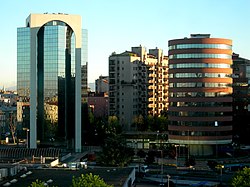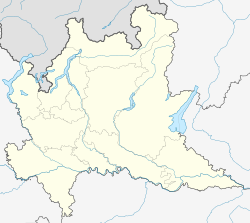|
Sesto San Giovanni
Sesto San Giovanni (Italian: [ˈsɛsto san dʒoˈvanni]; Western Lombard: Sest San Giovann, Lombard: [ˈsɛst ˌsãː dʒuˈʋan]), locally referred to as just Sesto (Lombard: Sest), is a comune (municipality) in the Metropolitan City of Milan, in the Italian region of Lombardy. It was awarded with the honorary title of città (city) by decree of 10 April 1954, signed by President Luigi Einaudi. HistoryAn unimportant agglomerate of buildings until the 19th century, Sesto San Giovanni grew during the end of the 19th century and in the early 20th century, becoming the site of several industries, including companies such as Falck, Campari, Magneti Marelli and Breda. In that period the population increased rapidly, from 5,000 inhabitants in 1880 to 14,000 in 1911. After World War II, Sesto became populated by many migrants from other parts of Italy, leading to an increased population of 95,000 inhabitants in 1981. Sesto used to be referred to as the "Stalingrad of Italy", due to the strong historical presence of the Italian Communist Party and to its resistance to fascism in World War Two. Because of its diverse and growing industries, Sesto has drawn many immigrants. Census statistics from 2016 state that 17% of the population is composed of immigrants.[3] In the 1990s, Sesto San Giovanni suffered an economic crisis, and most of the larger companies in the town closed their premises. The town partially succeeded in converting its economy from steel production to service industries. Several large companies opened offices in Sesto, such as ABB Group, WIND Telecommunications, Impregilo and Oracle Corporation. On 23 December 2016, Anis Amri, perpetrator of Berlin truck attack was shot fleeing in the city by the police. Sesto San Giovanni received the honorary title of city by presidential decree on 10 April 1954. Sesto San Giovanni was previously a left-wing working-class city, in contrast to Milan, which was a more right-leaning (DC, FI, Lega) business city. From 1946 to 2017, all city mayors came from left-wing parties. However, in 2017, it broke the tradition and elected Roberto di Stefano of Lega as mayor, whilst Milan has swung more left-wing in the same timeframe.[4][5] SportSesto San Giovanni is represented by professional football club Pro Sesto 1913, founded in 1913. Having played in the top division in its early years, the club has oscillated between the second and third tiers of the pyramid. They play at the Stadio Ernesto Breda which they share with local American football players and Inter Milan's women's and youth teams. People
International relationsTwin towns — sister citiesSesto San Giovanni is twinned with:[6]
References
|
||||||||||||||||||||||||||||||||||||||||||||||||||||||||




